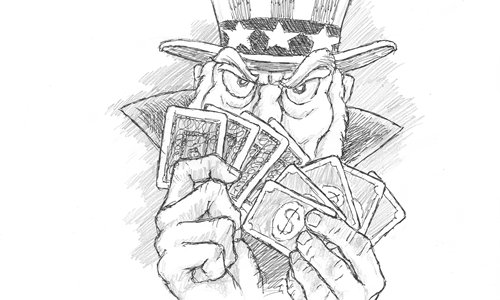HOME >> BUSINESS
Instability now normal in global economic relations
By Toumert AI Source:Global Times Published: 2019/9/15 18:43:39

Illustration: Peter C. Espina/GT
Many nations around the world stand shocked and amazed with the US administration. Since his inauguration nearly three years ago, US President Donald Trump has set a new tone that goes against many political and diplomatic norms.
As a scholar in the economic field and in the evolution of international relations, I was baffled at the beginning because I took, as many politicians and academics do, a 20th-century approach to decipher the US' actions.
But as my critical-thinking skills started kicking in, I took a step back and tried to understand the complex realities around this chaotic behavior.
A pattern began to take shape - the US is pushing forward a new way to deal with world affairs, and we must take note, understand and use it.
VUCA (volatility, uncertainty, complexity and ambiguity) is a term the Pentagon coined, and it became relevant after the 2001 September 11 attacks. It is important for nations and regions around the world, particularly China, Russia and the EU, to grasp the extent of this notion and to counter it with effective economic and strategic tactics.
The VUCA concept was developed in its early stages by students at the US Army War College in an attempt to understand the world as it emerged from the shadows of a brutal Cold War.
When the world moved on from its bipolar system, the US found itself facing challenges from asymmetric opponents and the world became multilateral.
The turbulent world was again reshaped by the 2008 financial crisis, which led many American financial institutions and policy makers - particularly conservative ones - to realize that the pre-crisis paradigm was gone.
Now the US is facing strong and asymmetrical global competitors from developing economies like China, Russia and Brazil. Competition is becoming more aggressive in the low-growth global economy. Global financial gaps negatively affect macro-economic planning. The amount of "big data" and AI is overwhelming policy makers' decision-making processes. The fifth industrial revolution, which is IT-based, is disrupting our economies at a fast rate.
The 21st-century Cold War is a technological one whether we accept it or not. The rapid pace of absorption by global citizens through smart devices, the internet-based economy and social media platforms outflanks and impacts traditional institutions that were previously used to assess global order based on predictability, common sense and a simple way of identifying opportunities and threats.
The VUCA philosophy is based on asymmetrical actions and ripple effects.
We have to understand that the VUCA concept in itself was a good strategy to solve the chaotic, unilateral world order that appeared soon after the demise of the USSR, and the financial crisis of 2008.
It does preach a new kind of thinking based on leaders being able to make decisions faster, and understanding the huge amounts of information provided by big data, where every single thing is interconnected more than ever before.
But as with any innovation in our human civilization, it can be corrupted. And the US administration, under the leadership of conservatives and nationalists, has succeeded in converting the concept from a strategy of bringing together global leadership to work as one to a strategy that enforces uncertainty in every corner of the globe.
The dismantling of the Iran deal, the unlimited flow of sanctions on Russia, providing Israel with fifth-generation stealth aircraft, hiking tariffs on China, renegotiating trade alliances, denying climate change and creating a space force were all actions announced through Tweets.
World leaders are finding it hard to decipher US actions, simply because they are not equipped to see the big picture and make sense of these erratic behaviors that are actually more complex and interlinked than we think.
Through 20th-century thinking, we would wait and seek political change to hope for a better deal, a more stable order. The truth is that the asymmetrical world, which is powered by technology and has a rapid pace of development that will leave many of us behind, is the new reality.
Leaders around the world have to understand this new environment and its norms. They need to understand that making sense is an old way of thinking, that today we need more collaboration between nations due to the ripple effect, that the challenges of today require more agility to communicate across nations, and that people and organizations should make quicker decisions and use technology and social media to draw from the many to see the new pattern emerging.
The author is director of education with the International Bachelor Program at the International School under the China Foreign Affairs University. bizopinion@globaltimes.com.cn
Posted in: INSIDER'S EYE